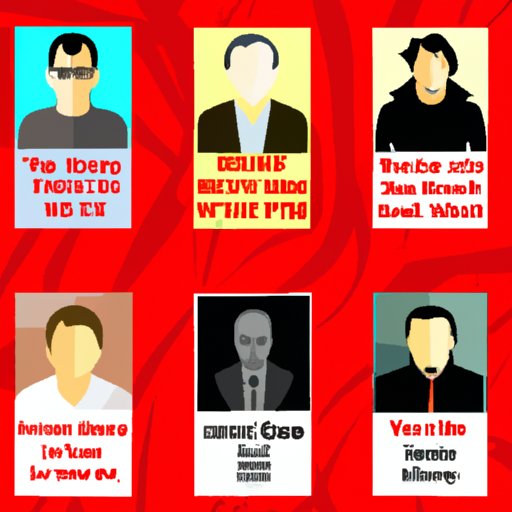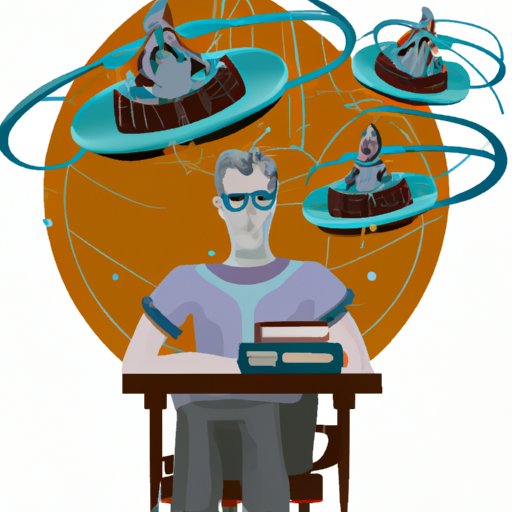Introduction
Science fiction is a genre of literature that combines elements of fantasy and science to explore ideas about the future, technology, and humanity. With roots stretching back to antiquity, science fiction has grown from humble beginnings to become one of the most popular genres in the world. This article will explore the development of science fiction over the past century and examine its impact on culture and society.
Timeline of Significant Events in the History of Science Fiction Literature
The history of science fiction is long and varied, but it was during the 20th century that the genre flourished and gained widespread popularity. Here are some of the key moments in the development of science fiction during the last century:
1920s-30s: The Golden Age of Science Fiction
The 1920s and 30s saw the emergence of some of the most influential authors in science fiction history, such as H.G. Wells and Hugo Gernsback. During this time, the genre shifted from being a fringe curiosity to becoming more widely accepted by mainstream audiences.
1940s-50s: Post-War Science Fiction Boom
In the wake of World War II, there was a surge in interest in science fiction. This period saw the emergence of some of the most iconic authors in the genre, including Isaac Asimov and Robert Heinlein. It also saw the publication of some of the most influential works in the history of science fiction, such as Arthur C. Clarke’s “Childhood’s End” and Ray Bradbury’s “Fahrenheit 451”.
1960s-70s: Expansion and Evolution of Science Fiction
The 1960s and 70s saw the expansion of science fiction into new areas, such as space opera, cyberpunk, and dystopian fiction. Authors like Ursula K. Le Guin, Philip K. Dick, and Frank Herbert pushed the boundaries of the genre and explored complex themes such as gender and race.
1980s-90s: Cyberpunk and Technological Advancements
The 1980s and 90s saw a rise in the popularity of cyberpunk, a subgenre of science fiction that focuses on the implications of advanced technology and artificial intelligence. William Gibson’s “Neuromancer” and Neal Stephenson’s “Snow Crash” are two of the most influential works of this period.
2000s-Present: New Media and Growing Popularity
The 2000s have seen a resurgence of interest in science fiction, with films like “Avatar” and “The Matrix” becoming box office hits. In addition, the proliferation of new media such as streaming services and ebooks has made science fiction more accessible than ever before.

Most Influential Authors and Works in the Genre
The last century has produced some of the most influential authors and works in the history of science fiction. Here are some of the most important figures and their contributions to the genre:
H.G. Wells
H.G. Wells is often credited as the father of modern science fiction. His novels, such as “The Time Machine” and “The War of the Worlds”, helped to define the genre and inspired generations of writers.
Isaac Asimov
Isaac Asimov is one of the most influential science fiction authors of all time. His works, such as the “Foundation” series and “I, Robot”, helped to shape the genre and introduced readers to the concept of robotics and artificial intelligence.
Robert Heinlein
Robert A. Heinlein is another giant of the genre, whose works such as “Stranger in a Strange Land” and “The Moon is a Harsh Mistress” have had a lasting influence on science fiction and popular culture.
William Gibson
William Gibson is the author of the seminal cyberpunk novel “Neuromancer” and is widely credited as the founder of the subgenre. His works have been praised for their prescience and exploration of the implications of technology.
J.K. Rowling
J.K. Rowling is best known for her Harry Potter series, which has become one of the most successful franchises in history. While not strictly science fiction, the series has been praised for its imaginative worldbuilding and exploration of themes such as magic and technology.
Other Notable Works
In addition to these authors, there have been many other influential works in the history of science fiction. Some of the most notable include Aldous Huxley’s “Brave New World”, George Orwell’s “1984”, and Margaret Atwood’s “The Handmaid’s Tale”.

Comparison of How Science Fiction Has Changed Over the Past Century
Science fiction has changed significantly over the last century. Here are some of the key ways in which the genre has evolved:
Changes in Technology
The most obvious change in science fiction over the past century has been the development of technology. In the early days of the genre, much of the focus was on space exploration and interplanetary travel, whereas today’s science fiction is often focused on technological advances such as artificial intelligence and virtual reality.
Changes in Storytelling
The way stories are told in science fiction has also changed over the past century. Early works tended to be more plot-driven, while modern works often focus on character development and exploration of themes.
Changes in Audience
Finally, the audience for science fiction has shifted over the past century. While the genre was once seen as a niche pursuit, it has now become mainstream, with films, television shows, and books attracting a wide range of viewers and readers.
Survey of Various Subgenres of Science Fiction and Their Development
Science fiction is a vast and diverse genre, and over the past century it has spawned countless subgenres. Here are some of the most popular subgenres and how they have developed over the last hundred years:
Hard Science Fiction
Hard science fiction is a subgenre that focuses on scientific accuracy and technical detail. Authors such as Arthur C. Clarke and Larry Niven have explored the possibilities of space travel and other scientific concepts in their works.
Social Science Fiction
Social science fiction is a subgenre that focuses on the implications of social and political trends. Authors such as Ursula K. Le Guin and Kim Stanley Robinson have explored themes such as gender, race, and environmentalism in their works.
Space Opera
Space opera is a subgenre of science fiction that focuses on intergalactic adventures and epic battles. Authors such as Anne McCaffrey and Lois McMaster Bujold have created memorable worlds and characters in their works.
Cyberpunk
Cyberpunk is a subgenre that focuses on the implications of advanced technology and artificial intelligence. Writers such as William Gibson and Neal Stephenson have explored the potential dangers and possibilities of this technology in their works.
Dystopian Fiction
Dystopian fiction is a subgenre that focuses on a future world that has gone wrong. Authors such as George Orwell and Margaret Atwood have explored themes such as totalitarianism, surveillance, and environmental disaster in their works.
Steampunk
Steampunk is a subgenre that combines elements of science fiction and fantasy. Authors such as China Miéville and Philip Pullman have explored alternate histories and fantastical technologies in their works.

Exploration of How Science Fiction Has Impacted Our Culture and Society
Science fiction has had a profound impact on our culture and society. Here are some of the ways in which the genre has shaped our world:
Cultural Impact
Science fiction has had a major influence on our culture, from films and television shows to video games and comics. The genre has also given us iconic characters, such as Darth Vader and Captain Kirk, and popular catchphrases, such as “May the Force be with you”.
Technology Impact
The genre has also had a major influence on technology. Many of the technologies we take for granted, such as cell phones and virtual reality, were first imagined in science fiction stories. As noted by technology historian George Dyson, “Science fiction is where we try out new ideas, and then engineers come along and make them real.”
Political Impact
Finally, science fiction has had an impact on politics, with many authors exploring themes such as power, oppression, and freedom in their works. From the Cold War era to the present day, science fiction has provided a space to discuss and debate difficult topics in a safe and imaginative way.
Conclusion
Over the past century, science fiction has grown from a fringe genre to a mainstream phenomenon. From iconic authors to influential works, the genre has left an indelible mark on our culture and society. It has also changed dramatically over the years, with advances in technology and shifts in storytelling styles. As the genre continues to evolve, it will remain a source of inspiration and exploration for generations to come.
(Note: Is this article not meeting your expectations? Do you have knowledge or insights to share? Unlock new opportunities and expand your reach by joining our authors team. Click Registration to join us and share your expertise with our readers.)
